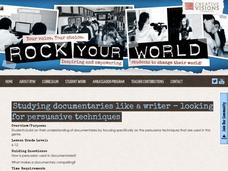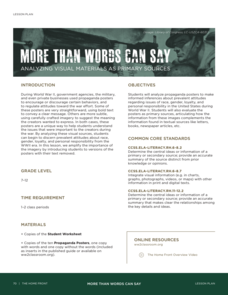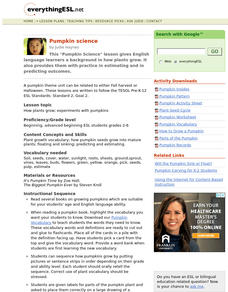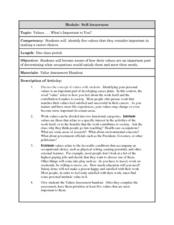Cornell University
Study Soil
What's in soil? Young scientists study the pH levels of soil from their school yard. They observe the land and area the soil came from to decide if location has anything to do with acidity level.
Curated OER
Word Up!
Study the importance of word choice in informational text. Middle and high schoolers locate unfamiliar words and phrases in newspaper articles of their choosing, and use online word sites to explore the definitions and histories of each....
Creative Visions Foundation
Studying Documentaries Like a Writer - Looking For Persuasive Techniques
Revisit the documentaries viewed in the previous lesson plan in this series in order to take a look at the persuasive techniques employed by the documentary creators. Small groups watch the films a second time, taking notes on two...
Curated OER
Mythological Word Origins
No wonder the ship was called the Titanic. An investigation of Norse, Roman, and Greek Mythology provides insight into mythological characters and corresponding words in the English language. A close look at roots, prefixes, and suffixes...
Montana Natural History Center
Studying Grassland Ecosystems
At first glance, grassland ecosystems might seem dull and uninteresting, but once you start to explore it's amazing the things you'll find! Through this series of engaging lessons, activities, and experiments, elementary students examine...
Curated OER
Lesson 1: The Importance of Rules in Our Country and in Our Classroom
Explore the importance of rules in a community with the engaging first lesson of this series on the US government. To begin, children play a paper clip game that requires them to make up their own rules as they go, after which the...
Curated OER
Keep Your English Up to Date: Chav
Take a look at linguistics and stereotypes in Great Britian with a word study of "chav." Learners find out what terms are pejoratives and what they are meant to convey. Geared toward British culture, study the ever-changing English...
National WWII Museum
More Than Words Can Say: Analyzing Visual Materials as Primary Sources
The propaganda of World War II was a key factor in galvanizing the home front. Class members examine images—without their text—to consider their messages, including those around race and gender. Using pictures and discussion questions,...
Curated OER
Go for the Gold!
The options are vast with this Ancient Greece and Olympics research project! Using Scholastic online resources, historians have interactive and educational supports to guide them through researching and writing about the 2004 Olympics in...
Curated OER
Myth Lesson Plans
What is the difference between myths, legends, and folktales? From greek mythology and creation myths to heroes and heroines, here is a nice series of lessons for providing your kids with solid foundational knowledge about myths.
Curated OER
Understanding History Through Oracle Bone Study
Learners study the Chinese characters and oracle bone inscriptions in order to understand the relevance of language to the reflection of cultural values. They examine the appearance of an oracle bone and the use of oracle bones in...
Carolina K-12
Plessy v. Ferguson & the Roots of Segregation
How far in the past do the roots of Jim Crow and segregation extend? Young historians closely consider this question using detailed PowerPoint slides as a basis for discussion rather than lecture, culminating in an activity where class...
National Endowment for the Humanities
Lesson 4 James Madison: Internal Improvements Balancing Act—Federal/State and Executive/Legislative
Who has the power? The founding fathers asked the same question when the United States was formed. Learners explore issues that arose during Madison’s presidency that raised constitutional questions. Through discovery, discussion, and...
National Endowment for the Humanities
Lesson 2 James Madison: The Second National Bank—Powers Not Specified in the Constitution
How much power is too much power for the federal government? Scholars use primary documents and constitutional research in groups to analyze the creation of the Second National Bank under James Madison. This is the second lesson of a...
New York City Department of Education
Egypt
This six-week unit encompasses all subjects with a focus study on world history and the development of ancient civilizations. As gifted and talented students dive into the interesting yet challenging topic of Egypt, they...
Curated OER
Making Money and Spreading the Flu!
Paper folding, flu spreading in a school, bacteria growth, and continuously compounded interest all provide excellent models to study exponential functions. This is a comprehensive resource that looks at many different aspects of...
Curated OER
Globe Skills Lesson 3 Voyage to the New World
Students explore the globe. In this globe skills lesson, students use their knowledge of latitude and longitude to respond to questions regarding Christopher Columbus's maiden voyage to the Americas.
Curated OER
After: A Study of Individual Rights
Use the dystopian novel After by Francine Prose to spark discussion about individual and student rights. Learners read the novel, evaluating how far a school can go to control its attendees. As they read, scholars...
Curated OER
A Comparison Study of Water Vapor Data to Precipitation over North America
Students use NASA satellite data to compare water vapor over the United States. In this data analysis lesson students use an Excel spreadsheet to map their data.
Park City Historical Society & Museum
Oral History Interview Questions Worksheet
What is an oral history interview? What goes into the planning and what should be said? Why is it important that we know and learn from oral history? This is an excellent worksheet to support your young historians as they conduct...
Curated OER
Discussing How Plants Grow
Study how plants grow with your English language learners with a cross-curricular lesson revolving around pumpkins. These activities provide opportunities to practice new scientific vocabulary while practicing skills such as estimating...
Curated OER
The Seeds We Need
Learners apply word analysis skills to recognize new words, identify genres of fiction and nonfiction, and identify important themes and topics. They explore differences in plants, flowers, and vegetables. A book bag full of activities...
Curated OER
Values...What's Important to You?
As your scholars begin their career study, it's important they understand their personal intrinsic values. What makes them feel rewarded? There are discussion prompts here to get learners thinking about specific careers, and they also...
Chymist
Esters: An Introduction to Organic Chemistry Reactions
Scratch and sniff an introduction to organic chemical reactions. A creative instructional activity has individuals study the esters commonly used in scratch-and-sniff stickers and advertisements. Following the lab procedure, scholars...























